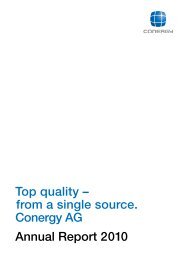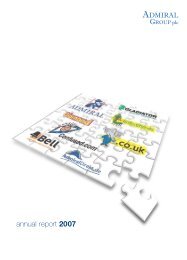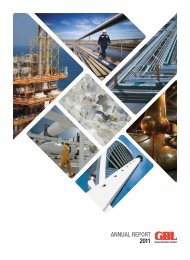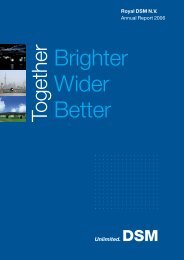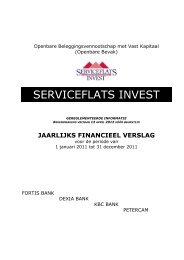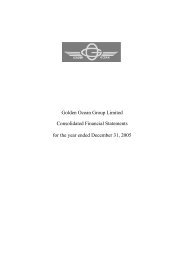Daimler Annual Report 2011 - Alle jaarverslagen
Daimler Annual Report 2011 - Alle jaarverslagen
Daimler Annual Report 2011 - Alle jaarverslagen
Create successful ePaper yourself
Turn your PDF publications into a flip-book with our unique Google optimized e-Paper software.
China has become increasingly important as a sales market<br />
for <strong>Daimler</strong> in recent years. In view of the declining dynamism<br />
of the world economy and the resulting drop in demand for<br />
exports, China is facing the challenge of repositioning its domestic<br />
economy: away from its dependence on investment and<br />
exports and towards stronger domestic demand. We generally<br />
assume that there will be a controlled deceleration of<br />
Chinese economic expansion, but another global recession<br />
would increase the risk of a “hard landing,” i.e., an abrupt<br />
slump in growth. But dangers exist for China’s economy also<br />
from within the country. Discussions about a possible credit<br />
or real-estate bubble have intensified due to the major stimulus<br />
program of recent years. In view of this credit boom, there<br />
is a risk of an increase in non-recoverable debt, especially for<br />
state-owned banks. It is true that the Chinese authorities<br />
have been attempting to dampen credit growth by means of<br />
monetary policy and administrative measures for about a<br />
year now, but prices are still rising. A sudden correction of<br />
real-estate prices would have serious consequences. In addition<br />
to a possible bank crisis, the construction industry as a key<br />
growth driver of the Chinese economy would come under<br />
massive pressure. Furthermore, private households would suffer<br />
from the related asset losses. Together with a continuation<br />
of high or even rising inflation, the danger of social unrest in<br />
China would increase sharply. As China is the world’s secondlargest<br />
economy and increasingly has the role of global growth<br />
engine, contributing to economic growth in many regions<br />
due to its immense demand for goods and raw materials, such<br />
unrest would have far-reaching consequences for the world<br />
economy.<br />
We see an additional risk in the development of raw-material<br />
prices. If prices were to rise sharply and depart from fundamentally<br />
justified levels, the assumed global economic outlook<br />
would be jeopardized. In recent months, raw-material markets<br />
have already eliminated part of the specu lative excess, but with<br />
a continuation of expansive monetary policy there is still a<br />
danger of speculative bubbles. If such a bubble were to burst,<br />
that would dampen growth considerably, particularly in those<br />
countries that export raw materials. High supply risks exist with<br />
regard to some special raw materials such as rare earths –<br />
in particular due to the concen tration of global mining in a small<br />
number of countries.<br />
Risks for market access and the global networking of the Group’s<br />
facilities could arise as a result of weakening of international<br />
free trade in favor of regional trade blocks or the emergence<br />
of protectionist tendencies. The latter could occur<br />
in particular due to competitive devaluation resulting from<br />
insufficient adjustment of exchange rates and an increase<br />
in speculative capital movements. In addition, new barriers to<br />
trade such as higher import duties could hinder the business<br />
activities of multinational companies like <strong>Daimler</strong>. An increase<br />
in bilateral free-trade agreements outside the European<br />
Union could also affect <strong>Daimler</strong>’s position in key foreign markets.<br />
Recent geopolitical unrest, as occurred in the Near East and<br />
North Africa in <strong>2011</strong>, has made it clear that such events can<br />
also have an impact on the development of the world economy.<br />
Even if the unrest is regionally limited, indirect effects such<br />
as higher oil and raw-material prices could have the effect of<br />
dampening global growth.<br />
Industry and business risks<br />
General market risks. As explained in the previous sections,<br />
there are considerable economic risks for the development<br />
of demand for motor vehicles. And competitive pressure in<br />
the automotive markets is as high as ever. Customers have<br />
meanwhile become used to a certain level of sales-supporting<br />
actions. If this competitive pressure in the automotive<br />
markets becomes even tougher, possibly due to further worsening<br />
of global economic developments, it could lead to the<br />
increased application of sales-promoting financing offers and<br />
other incentives. That would not only reduce revenues in the<br />
new-vehicle business, but would also lead to lower price levels<br />
in used-vehicle markets and thus to falling residual values.<br />
In many markets, a shift in demand towards smaller, more fuel<br />
efficient vehicles is apparent; this is the result of customers’<br />
significantly increased sensitivity to vehicles’ environmental<br />
friendliness and the development of fuel prices. In order to<br />
enhance the attractiveness of less fuel-efficient vehicles, additional<br />
actions might become necessary with a negative<br />
impact on earnings. This, together with the shift in the model<br />
mix towards smaller vehicles with lower margins, would place<br />
an additional burden on the Group’s financial position, cash flows<br />
and profitability. Due to the competitive pressure in auto <br />
motive markets, it is essential for us to continually and successfully<br />
adapt our production and cost structures to changing<br />
conditions. If we fail to do so, this would affect the Group’s<br />
competitiveness and could once again require cost-intensive<br />
restructuring actions.<br />
The recent crisis years have also led to a worsening of the<br />
financial situation of some suppliers, dealerships and<br />
vehicle importers. For this reason, it is still not possible to<br />
rule out individual or joint supporting actions by the vehicle<br />
manufacturers, which would have a negative impact on <strong>Daimler</strong>’s<br />
profitability, cash flows and financial position.<br />
116






